Installation Guide - Intuitive for PaperCut V3
This article describes how to install Intuitive for PaperCut V3.
1 Introduction
Intuitive Dashboards for PaperCut MF enables you to harness the data stored within your PaperCut MF print management software by presenting a visual and dynamic data summary for all key stakeholders, ensuring you can easily manage and control print usage and spend.
Intuitive for PaperCut V3 is designed to work with the Data Integrations feature of PaperCut MF
2 Solution Architecture
The Intuitive for PaperCut MF solution takes advantage of the data integrations features of PaperCut MF which is available in all versions since V20.0. The dashboard solution is deployed onto a Windows server which can be a physical, virtual or hosted platform. The Intuitive solution may also be co-hosted with your PaperCut MF application.
The PaperCut MF Data Integrations feature produces daily data files detailing
- Print usage
- New or updated users
- New or updated printers
- New or updated accounts
- New of updated servers
The data files are processed by the Intuitive ETL application (Extract Transform Load) and prepared in a SQLite database for use by the Intuitive Dashboards application. The entire data load process is automated and refreshes the data overnight. Data is automatically collected and updated overnight and used to populate the dashboards. For existing PaperCut MF installations, the solution allows for the import of historical data to populate the dashboards.
The dashboard solution maintains a multiyear record of the print, copy, scan and fax activity in a local SQLite database. Database views are created within the dashboard application known in Intuitive as Datafeeds. Each Datafeed performs a specific piece of analysis and are used to create the Datasets which underpin the visual components and dashboards.
Users access the dashboards by connecting to the dashboard server via any network connected device with a HTML5 compliant browser (Usually a PC or tablet).
In order to access the dashboards, users first need to pass authentication. Intuitive for PaperCut ships with its own internal user authentication and permission system. Users can also be attached from a Microsoft Active Directory (‘AD’) or other LDAP compliant repository. This enables users to authenticate to the dashboards using their network username and password.
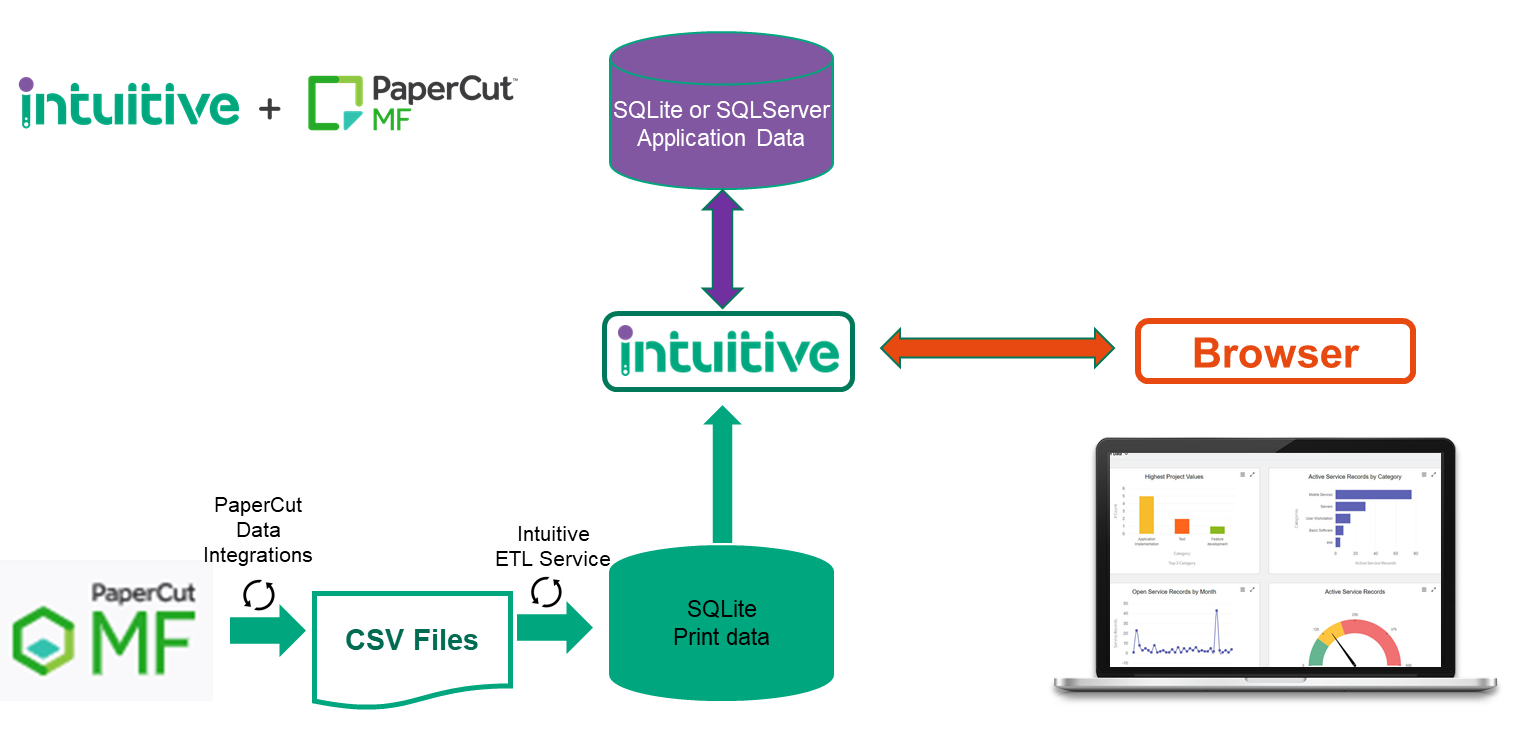
2.1 Preparing the environment for installation
The 'Intuitive for PaperCut' solution can be co-hosted with your PaperCut MF application and it is anticipated that most installations will follow this path. A detailed guide on sizing your server can be read on the knowledgebase article.
Standalone Hardware Requirements
The following table lists the minimum standalone hardware requirements for installing the Intuitive Dashboards for PaperCut MF software:
|
Component |
Details |
|
Processor |
Dual-Core processor or faster |
|
Memory |
8 GB RAM |
|
Disk Space |
50 GB free disk space |
|
Minimum standalone hardware requirements |
|
Side by side Hardware Requirements
The following table lists the minimum side by side hardware requirements for installing the Intuitive Dashboards for PaperCut MF software:
|
Component |
Details |
|
Processor |
Quad-Core processor or faster |
|
Memory |
8 GB RAM |
|
Disk Space |
50 GB free disk space |
|
Minimum side by side hardware requirements |
|
Customer requirements
Good practice is to check the actual amount of memory used by the application after you have loaded the dashboard for the first time. Take into account how much historical data you have available at the time of installation and perhaps schedule to check the installation again after it has been running for a few months.
The memory used can be checked through the task manager on your server and searching for the Intuitive Dashboard Service. There is also a memory manager included in the administration screens of the user interface which give an estimation of the memory occupied by Intuitive Dashboards.
Since Intuitive Dashboards is an in memory application, the memory usage is persistent and will not be released whilst the Intuitive Dashboard service is still running.
The Intuitive Dashboard service uses CPU on demand and therefore only tends to occupy the CPU for short periods. The Intuitive Dashboard service will call for CPU when:-
- The ETL service is loading data - Default is once per day at 2 a.m.
- When the Datafeeds refresh the data in memory - Default is once per day at 4 a.m.
- When a user views a dashboard or applies a filter - On demand
The below illustrates three real-life customer scenarios of the resources occupied on the server. These examples will give you an approximation of the impact on your customer, although it should be noted each customers usage pattern will create a unique set of requirements.
|
Customer Scenario 1 |
|||||||||||||
|
TABLES (ROWS) |
DEVICES |
MEMORY USAGE |
MEMORY USAGE PER DEVICE |
||||||||||
|
1.5k |
1.1 GB |
73 MB per 100 devices 730 MB per 1000 devices |
||||||||||
|
Customer Scenario 2 |
|||||||||||||
|
TABLES (ROWS) |
DEVICES |
MEMORY USAGE |
MEMORY USAGE PER DEVICE |
||||||||||
|
3.7k |
2.4 GB |
64 MB per 100 Devices 640 MB per 1000 devices |
||||||||||
|
Customer Scenario 3 |
|||||||||||||
|
TABLES (ROWS) |
DEVICES |
MEMORY USAGE |
MEMORY USAGE PER DEVICE |
||||||||||
|
547 |
0.1 GB |
20 MB per 100 devices 200 MB per 1000 devices |
||||||||||
Software Requirements
Windows Operating System
The following table lists the minimum software requirements for installing the Intuitive Dashboards for PaperCut MF solution:
|
Operating System |
Database |
|
Windows Server 2012 (32 or 64 bit) onwards |
SQLServer & SQLServer Express 2008 R2 SP2 onwards (Optional) SQLite (Included in the installation package) - Recommended |
|
Minimum OS and Database requirements |
|
On Server and Desktop installations, Windows .NET v4.0 Framework or later must be installed as a prerequisite. Windows IIS and IIS Manager must also be installed.
Dashboard Client (UI)
Intuitive Dashboards uses HTML5 which is supported across all modern browsers across Windows, Apple and Mobile platforms.
Network Security
If running Intuitive Dashboards on a separate server from PaperCut, the Intuitive service should be able to access the PaperCut MF folder under program files.
If using a remote SQL server, the Intuitive service should be able to network to the remote server and have permissions to Create, Read and Write to its own database.
A recommended approach is to create a single user called 'DashboardService' which can hold all of the required permissions to the local server, PaperCut server and (depending on configuration) SQL Server.
User Permissions
- Administration rights for local server
- Depending on database configuration, SQL Server administrator for the Intuitive configuration database
- Access to Data Integrations folder under PaperCut MF
3 Preparing the SQL Server Instance (Optional)
Intuitive Dashboards uses SQL Server 2008 R2 SP2 (and above) or a SQLite database as a persistence layer to store dashboard definitions.
The recommendation is that you select the SQLite option as the the creation of the SQLite database, drivers and libraries is automatically handled by the installer.
For a SQL Server implementation, the details of the SQL instance will be requested during installation process so please have both the instance details and security credentials to hand. You will need to create or use an existing SQL user that has permissions to create a database and then have ongoing permission to READ/WRITE e.g. dbo
4 Installing the Intuitive for PaperCut Software
Locate and run the Intuitive Dashboards installation file provided.
Intuitive Dashboards 6.1 Release Build (6.1.0.xxxxx).exe
This will launch a setup Wizard which will talk you through the installation steps.
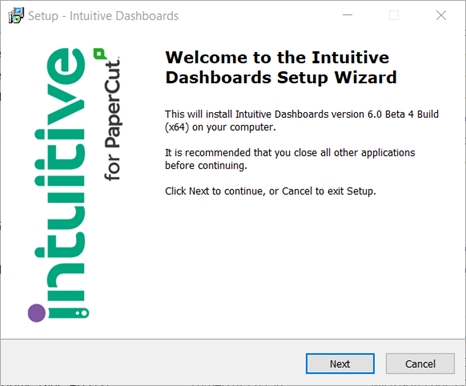
Click next to proceed to the first step of the installation.
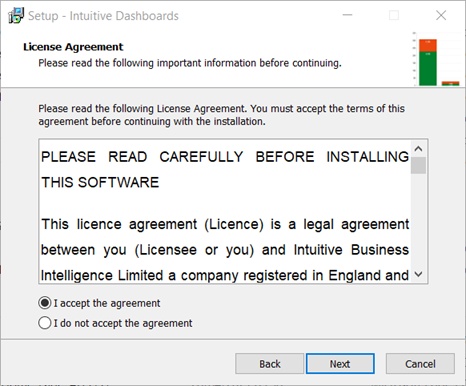
Please read the terms and conditions and select to accept. Click next to proceed to the next step of the installation.
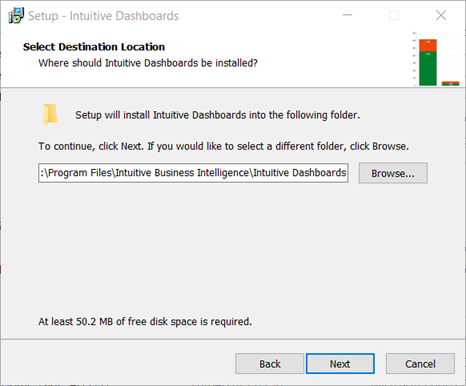
Specify a path for Intuitive Dashboards or to use the default click Next

Select the appropriate database type for the Intuitive Dashboard definitions. The recommended .
4.1 SQL Server Implementation

If you have selected SQL server, insert the path to your SQL server instance that will host the dashboard definitions database.
Configure the credentials and if necessary, enter the username and password to be used. Test the connection and ensure that the connection is successful. You will not be able to proceed to the next installation step if the connection fails.
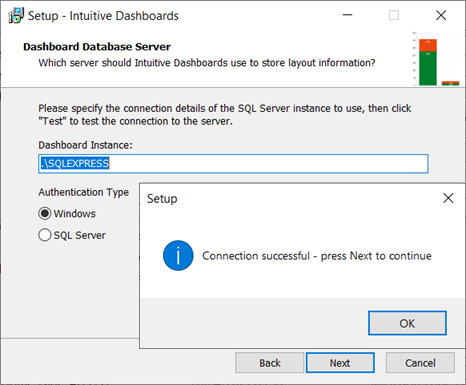
Once you have performed a successful connection test, Click Next.

Specify the name of the database to be created on the SQL and then click Next
4.2 SQLite Implementation
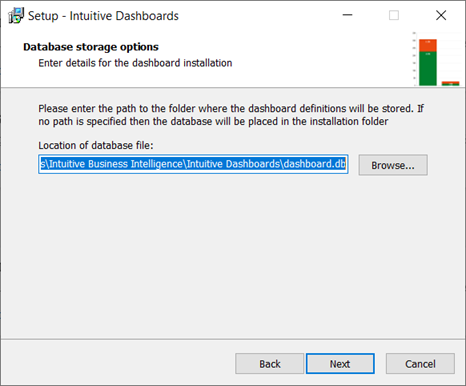
The default path of the dashboard.db file can be found in the path below, but if you specify any other directory, the installer will update the ETLService.config automatically.
C:\Program Files\Intuitive Business Intelligence\Intuitive Dashboards\
Once you've confirmed the location, click next.
4.3 Installation Continuation
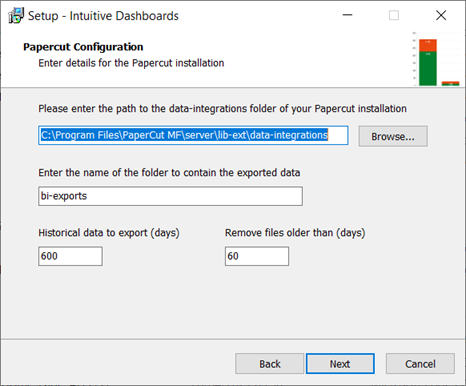
When the Intuitive for PaperCut solution is installed, it automatically creates a file called Intuitivebi.properties . PaperCut will look for this file and start producing data exports either:-
- When the service is re-started
- When the next maintenance window runs
- When the load integrations button is selected in the management console
When first run, the data integrations can be set to export historical data as specified. You can also specify how long that data files should be kept. This setting does not affect how long the Intuitive solution keeps its data. For this reason we recommend you keep it as default.
Click next to proceed
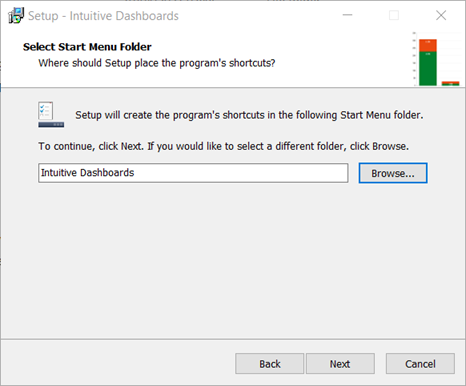
Specify a folder for the shortcut icons or to use the default click Next
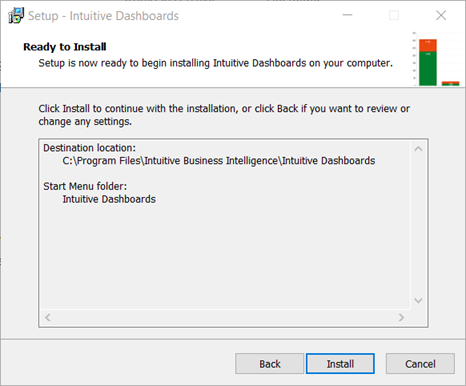
Lastly, click Install
5 Configuring Internet Information Services (IIS)
In order to make Intuitive Dashboards reachable by client browsers you will need to configure a web page in IIS.
First locate and open IIS on your server.
Once open Right click on the sites and select 'Add Website'


The physical path for the website should be set to match your installation. The default path, if not changed during installation would be as follows: - C:\Program Files\Intuitive Business Intelligence\Intuitive Dashboards\Client
As a default Intuitive is set to run on port 80. If you wish to run Intuitive on a different port please raise a ticket with support for guidance. There may be a default website running under IIS. This website is also configured under port 80 and should therefore be deleted.
Once configured you will need to start your website using the controls on the right hand side of the screen.

Next installation step - Loading data into the dashboards